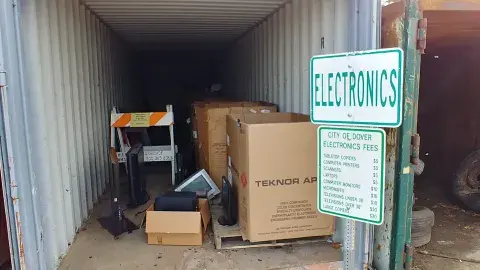
Recycling facility operators and staff were interested to share ideas at the April 13th Members/Operations Marketing (MOM) meeting held virtually. Heather Herring, Member Services Representative at NRRA, first asked the membership via email: “How do you decide what your fee structure is for items at your Transfer Station?” and “Do you update these fees annually or….never?” Members responded to the listserv and during the meeting to compare notes. It really comes down to each town’s disposal fee philosophy. How much is your town paying in taxes, what does your selectboard want, and do the selectboard members use the facility and see the results?
Hampton, NH explained their process for evaluating disposal fees. They compare what residents paid in fees to what the town paid the vendor to dispose the items. If the values are very close, they don’t change the fee. If they spent thousands more than they brought in, they would increase the fee.
Pelham, NH is increasing their fees in June for the first time in nine years to recoup the costs for disposal. They plan to charge $50 per mattress just to cover costs, $3 per tire to cover some of the costs, $10 per propane tank, and $30 per TV to cover the costs. Wooden furniture costs a lot of money to dispose of and there is a wood waste ban going into effect with their vendor later this year. It was suggested that some usable incoming pieces of furniture could be set aside for free reuse. Posting a photo of an unwanted item on Freecycle or Facebook Marketplace can match a new owner with the free item quickly and no need to wait until someone stops by the recycling facility.
Gilford, NH purchased a truck scale, which highlighted the cost of disposing construction and demolition debris. They were only covering half of their disposal costs, so they decided to increase fees by $.02 per pound to cover expenses for the next two years. They decided on a fee by looking at what surrounding towns charge.
The range of disposal fees for electronic devices and refrigerators, for example, varied from free up to $21 per unit depending on the NRRA member’s state or town. Vermont has a state law that all electronics are collected free of charge and the facility receives a few cents per pound for the material.
Paul Tomasi, Director of the Northeast Kingdom Waste Management District (NEKWMD), noted that they used to charge for freon removal, but found that the units would come in with the lines cut, so they now accept them for free to discourage that practice.
Tires are charged per ton and NEKWMD pays to have them hauled away. They were losing money, so they set up a three-tiered system: tires under 18”, tires between 19” and 25”, and tires over 25”. Prices are doubled in each category for any tire still on a rim.
Bagged trash can be priced based on the fees associated with removal – hauling, tipping, and bags. There are plenty of estimates for the weights of various bag sizes. Labor and other associated costs can also be factored in as well.
There was concern about raising prices too much for residents to handle. One suggestion was to provide directions to residents on how to break down their own mattress or box spring into its basic materials in 20 minutes, perhaps saving them $25-$50 for their labor. Once a mattress is broken down, the metal goes into scrap metal for free, untreated wood goes into the wood pile, and the foam and fabric can fit into two garbage bags. The same idea could work for couches, chairs, and futons.
Lancaster, NH recently updated their disposal prices, including construction and demolition fees, because they were losing 47% in costs. They wish to cover their disposal fees and they charge $1.50 per bag in their Pay As You Throw (PAYT) program for municipal solid waste. By comparison, Littleton, NH covers disposal tipping fees, transportation, the cost of two and half staff for labor, and the cost of the bag. They charge $3 per bag. For a few years, the higher prices in Littleton resulted in some residents going elsewhere to dispose of items, but they came back once the private haulers raised their prices, too.
Some towns use a portion of the motor vehicle registration fees to help with disposal costs at their municipal facility. Tara Albert, Training and Certification Coordinator at the NH Department of Environmental Services, provided this link to contact them to see if your town participates in this fund in NH.
Raise the question at your recycling facility and dust off your disposal fees by reviewing the examples in this article or from other NRRA member communities on our website.
